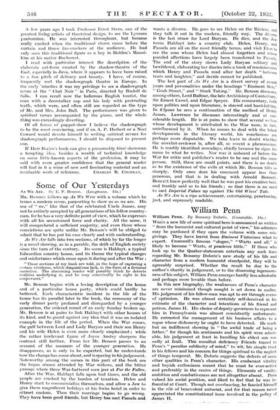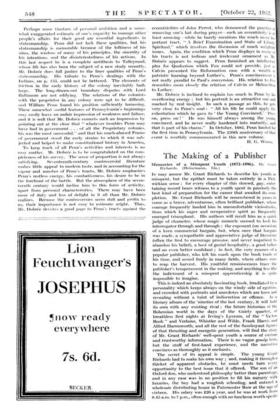William Penn
William Penn. By Bonamy Dobnie. (Constable. 18s.) WHEN a new life of some spiritual hero is announced as written " from the humanist and cultured point of view," his admirers may be pardoned if they open the volume with some mis- givings. They have learnt from Eminent Victorians what to expect. Cromwell's famous "slogan," " Wafts and all," is likely to become " Warts, et praeterea little." If those who look up to the Quaker-statesman entertain any such fears regarding Mr. Bonamy Dobree's new study of his life and character from a modern humanist standpoint, they will be agreeably surprised. Whether the result be due to the author's charity in judgement, or to the disarming ingenuous- ness of his subject, William Penn emerges hardly less admirable and perhaps more lovable than before.
In this new biography, the weaknesses of Penn's character are never minimized though nought is set down in malice. His judgement of his fellow-men was apt to err through excess of optimism. He was almost certainly self-deceived in his estimate of the character and intentions of his friend and patron, James II. His choice of deputy-governors to represent him in Pennsylvania was almost consistently unfortunate. He entrusted the management of his business affairs to a rogue whose dishonesty he ought to have detected. He made but an indifferent showing in " the awful trade of being a father," for though his sentiments and his spirit were admir- able, his judgement at least in handling his eldest son was sadly at fault. This manifest deficiency Friends traced to Penn's " peculiar sublimity of mind," to wit; his simple trust in his fellows and his concern for things spiritual to the neglect of things temporal. Mr. Dobrie suggests the defects of some other qualities in Penn's character. His exuberant vitality and boyish enthusiasm meant that he must be ever-active and preferably in the centre of things. Elements of vanity,
ambition and combativeness are not altogether absent. Penn valued his social position, and liked to feel that he was in-
fluential at Court. Though not overbearing, he fancied himself in the role of benevolent autocrat, and for that reason never appreciated the constitutional issue involved in the policy of James II. Perhaps some tincture of personal ambition. and a some- what exaggerated estimate of one's capacity to manage other people's affairs for their good are essential ingredients in statesmanship. Penn did not lack these qualities, but his statesmanship is memorable because of the loftiness, of his aims, the wisdom of many of his principles, the sincerity of his intentions, and the disinterestedness of his actions. In this last respect he is a complete antithesis to Talleyrand, whose life has also been the subject of a new study recently.. Mr. Dobree does full justice to the finer qualities of Penn's statesmanship. His tribute to Penn's dealings with the Indians, on p. 155. could not be bettered. The elements of friction in the early history of the colony inevitably bulk large._ The long-drawn-out boundary disputes with Lord Baltimore are not edifying. The relations of the colonists with the proprietor in any • colony were apt to be difficult, and William Penn • found his' position sufficiently harassing. These somewhat sordid features of Pennsylvania's beginnings may easily leave an unfair impression of weakness and- failure, and it is well that Mr. Dobree corrects such an impression by pointing out at the close that " whatever troubles Penn may have had in government . . . of all the Proprietary colonies, his was the most successful," and that his much-abused Frame of government stood the early strains to which it was sub- jected and helped to make constitutional history in America.
To keep track of all Penn's activities and interests is no easy matter. Mr. Dobree is to be congratulated on the com- pleteness of his survey. The sense of proportion is not always satisfying. Seventeenth-century controversial literature makes little appeal to modern taste, and in accounting for the vigour and number of Penn'S tracts, Mr. Dobree emphasizes Penn's restless energy, his combativeness, his desire to be in the forefront of the battle. But the atmosphere of the seven- teenth century would incline him to this form of activity, apart from personal characteristics. There may have been more of duty and less of delight in it all than Mr. Dobree realizes. Because the controversies seem dull and prolix to us, their importance is not easy to estimate aright. Tiflis. Mr. Dobree devotes a good page to Penn's tracts against the
-eccentricities of John Perrot, who denounced the practice removing one's hal during prayer--such an eccentricity is at least amusing —while he barely mentions the much more in portant tract, " A Brief Examination and State of Lawn% Spiritual," which involves the discussion of much weightier issues. Again, the erudition which Penn displays in many (4 his tracts is not tedious and irrelevant ornament as Mr. Dobree appears to suggest. Penn furnished an intellectual plea for Quakerism which Fox could not provide, just as Calvin presented the Reformation case with a wealth of patristic learning beyond Luther's. Penn's convincement k not really parallel to Paul's conversion. his relation to Fox resembles more closely the relation of Calvin or Melanethua to Luther..
Mr. Dobree is inclined to enplain.too much in Penn by his overflowing energy ; but his portrait is an attractive one and marked -by real insight. - In such a passage as this, lie gets very close to Penn's soul : " All his life he could apply the exhortation which he gave to ' the Young Convinced,' Press on, press on ! ' He was himself always among the, young convinced, and he never really hardened into maturity, and that is part of his charm." In October, 1682, Penn landed for the first time in Pennsylvania. The 250th anniversary of that event is worthily commemorated in this new volume.
H. G. Woof).















































 Previous page
Previous page